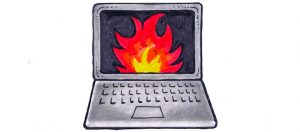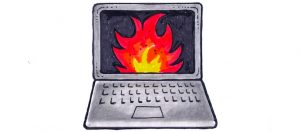‘We are here to deliver your message. Period.’
By John Swaine
The Guardian (4/10/18)
The chairman of Sinclair Broadcast Group met Donald Trump at the White House during a visit to pitch a potentially lucrative new product to administration officials, the Guardian has learned.
David D Smith, whose company has been criticised for making its anchors read a script echoing Trump’s attacks on the media, said he briefed officials last year on a system that would enable authorities to broadcast direct to any American’s phone.
“I just wanted them to be aware of the technology,” Smith said in an interview. He also recalled an earlier meeting with Trump during the 2016 election campaign, where he told the future president: “We are here to deliver your message.”
Sinclair is the biggest owner of local TV in the US, and may soon reach 72% of American households if a proposed $4bn takeover of a rival is approved by federal regulators. It is accused by critics of having a conservative bias, which it denies.
The company has been a driving force in the development of a new broadcasting standard known as Next Gen TV, and is one of the first involved in making chipsfor televisions, cellphones and other devices to receive the new transmissions.
A broadcasting industry group, of which Sinclair is a prominent member, lobbied federal authorities last year to force manufacturers to incorporate the chips in all new devices. This would have created orders for millions of chips and likely new revenues for Sinclair.
Smith said his White House meeting was not financially motivated. The Federal Communications Commission (FCC) decided last November to make incorporating chips voluntary. Sinclair had itself stopped short of calling for compulsory installation but said the government might need to consider this in the future.
As well as entertainment, the chip allows mobile devices to receive messages from an upgraded government public warning system, through which authorities can send video statements and multimedia even when telephone lines are down.
“The public interest aspect is enormous in terms of the lives it will save,” said Smith. The chips would, he said, allow authorities to target any individual cellphone, all phones in a specific zipcode, or other select recipient lists. …


